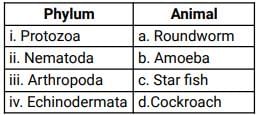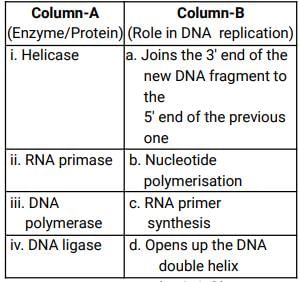SSC CGL Exam > SSC CGL Tests > SSC CGL Previous Year Papers > Test: SSC CGL Previous Year Questions: Biology (2023-20) - 5 - SSC CGL MCQ
Test: SSC CGL Previous Year Questions: Biology (2023-20) - 5 - SSC CGL MCQ
Test Description
30 Questions MCQ Test SSC CGL Previous Year Papers - Test: SSC CGL Previous Year Questions: Biology (2023-20) - 5
Test: SSC CGL Previous Year Questions: Biology (2023-20) - 5 for SSC CGL 2025 is part of SSC CGL Previous Year Papers preparation. The Test: SSC CGL Previous Year Questions: Biology (2023-20) - 5 questions and answers have been
prepared according to the SSC CGL exam syllabus.The Test: SSC CGL Previous Year Questions: Biology (2023-20) - 5 MCQs are made for SSC CGL 2025 Exam. Find important
definitions, questions, notes, meanings, examples, exercises, MCQs and online tests for Test: SSC CGL Previous Year Questions: Biology (2023-20) - 5 below.
Solutions of Test: SSC CGL Previous Year Questions: Biology (2023-20) - 5 questions in English are available as part of our SSC CGL Previous Year Papers for SSC CGL & Test: SSC CGL Previous Year Questions: Biology (2023-20) - 5 solutions in
Hindi for SSC CGL Previous Year Papers course. Download more important topics, notes, lectures and mock
test series for SSC CGL Exam by signing up for free. Attempt Test: SSC CGL Previous Year Questions: Biology (2023-20) - 5 | 100 questions in 60 minutes | Mock test for SSC CGL preparation | Free important questions MCQ to study SSC CGL Previous Year Papers for SSC CGL Exam | Download free PDF with solutions
Test: SSC CGL Previous Year Questions: Biology (2023-20) - 5 - Question 1
Which group of Kingdom Animalia has unsegmented, bilaterally symmetrical, soft bodies, with a triploblastic construction (comprising three layers of cells) and a lacking coelom, skeleton, and anus?
[SSC CGL 24/07/2023 (3rd shift)]
Detailed Solution for Test: SSC CGL Previous Year Questions: Biology (2023-20) - 5 - Question 1
Test: SSC CGL Previous Year Questions: Biology (2023-20) - 5 - Question 2
Match the columns.

[Higher Secondary 27/06/2023 (Shift - 3)]

Detailed Solution for Test: SSC CGL Previous Year Questions: Biology (2023-20) - 5 - Question 2
Test: SSC CGL Previous Year Questions: Biology (2023-20) - 5 - Question 3
Which of the following does NOT belong to class Insecta?
[SSC Stenographer 13/10/2023 (Morning)]
Detailed Solution for Test: SSC CGL Previous Year Questions: Biology (2023-20) - 5 - Question 3
Test: SSC CGL Previous Year Questions: Biology (2023-20) - 5 - Question 4
Which among the following is an example of Phylum Mammalia of Animal Kingdom?
[SSC MTS 16/05/2023 (Afternoon)]
[SSC MTS 16/05/2023 (Afternoon)]
Detailed Solution for Test: SSC CGL Previous Year Questions: Biology (2023-20) - 5 - Question 4
Test: SSC CGL Previous Year Questions: Biology (2023-20) - 5 - Question 5
Snails is an example of which of the phylum of the animal kingdom?
[SSC MTS 20/06/2023 (Afternoon)]
[SSC MTS 20/06/2023 (Afternoon)]
Detailed Solution for Test: SSC CGL Previous Year Questions: Biology (2023-20) - 5 - Question 5
Test: SSC CGL Previous Year Questions: Biology (2023-20) - 5 - Question 6
Identify the organism that is NOT a pseudocoelomate.
[SSC CGL 02/12/2022 (1st Shift)]
[SSC CGL 02/12/2022 (1st Shift)]
Detailed Solution for Test: SSC CGL Previous Year Questions: Biology (2023-20) - 5 - Question 6
Test: SSC CGL Previous Year Questions: Biology (2023-20) - 5 - Question 7
Which of the following classifications do humans NOT fall under?
[SSC MTS 07/07/2022 (Evening)]
[SSC MTS 07/07/2022 (Evening)]
Detailed Solution for Test: SSC CGL Previous Year Questions: Biology (2023-20) - 5 - Question 7
Test: SSC CGL Previous Year Questions: Biology (2023-20) - 5 - Question 8
Which of the following statements is/are correct?
I. Amoeba ingests its food with the help of pseudopodia.
II. Amoeba constantly changes its shape and position.
[SSC MTS 11/07/2022 (Afternoon)]
I. Amoeba ingests its food with the help of pseudopodia.
II. Amoeba constantly changes its shape and position.
[SSC MTS 11/07/2022 (Afternoon)]
Detailed Solution for Test: SSC CGL Previous Year Questions: Biology (2023-20) - 5 - Question 8
Test: SSC CGL Previous Year Questions: Biology (2023-20) - 5 - Question 9
Which of the following is an example of Phylum Annelida of Animal Kingdom?
[SSC MTS 15/07/2022 (Evening)]
[SSC MTS 15/07/2022 (Evening)]
Detailed Solution for Test: SSC CGL Previous Year Questions: Biology (2023-20) - 5 - Question 9
Test: SSC CGL Previous Year Questions: Biology (2023-20) - 5 - Question 10
To which of the following classes do parrots belong?
[SSC MTS 18/07/2022 (Afternoon)]
[SSC MTS 18/07/2022 (Afternoon)]
Detailed Solution for Test: SSC CGL Previous Year Questions: Biology (2023-20) - 5 - Question 10
Test: SSC CGL Previous Year Questions: Biology (2023-20) - 5 - Question 11
The bodies of the animals of phylum Platyhelminthes show _________ grade organisation.
[SSC CHSL 02/06/2022 (Morning)]
[SSC CHSL 02/06/2022 (Morning)]
Detailed Solution for Test: SSC CGL Previous Year Questions: Biology (2023-20) - 5 - Question 11
Test: SSC CGL Previous Year Questions: Biology (2023-20) - 5 - Question 12
Which of the following characters are correct about Phylum Echinodermata?
[SSC CHSL 03/06/2022 (Morning)]
[SSC CHSL 03/06/2022 (Morning)]
Detailed Solution for Test: SSC CGL Previous Year Questions: Biology (2023-20) - 5 - Question 12
Test: SSC CGL Previous Year Questions: Biology (2023-20) - 5 - Question 13
What is a good way to measure the population density of fish found in lakes?
[SSC CHSL 09/06/2022 (Evening)]
[SSC CHSL 09/06/2022 (Evening)]
Detailed Solution for Test: SSC CGL Previous Year Questions: Biology (2023-20) - 5 - Question 13
Test: SSC CGL Previous Year Questions: Biology (2023-20) - 5 - Question 14
Which of the following statements is correct with respect to chordates?
[SSC CGL 11/04/2022 (Afternoon)]
[SSC CGL 11/04/2022 (Afternoon)]
Detailed Solution for Test: SSC CGL Previous Year Questions: Biology (2023-20) - 5 - Question 14
Test: SSC CGL Previous Year Questions: Biology (2023-20) - 5 - Question 15
‘Hypnea Indica and Hypnea bullata’ are types of:
[SSC CGL 19/04/2022 (Evening)]
[SSC CGL 19/04/2022 (Evening)]
Detailed Solution for Test: SSC CGL Previous Year Questions: Biology (2023-20) - 5 - Question 15
Test: SSC CGL Previous Year Questions: Biology (2023-20) - 5 - Question 16
How many components do bacterial flagella have?
[SSC Stenographer 13/10/2023 (Evening)]
[SSC Stenographer 13/10/2023 (Evening)]
Detailed Solution for Test: SSC CGL Previous Year Questions: Biology (2023-20) - 5 - Question 16
Test: SSC CGL Previous Year Questions: Biology (2023-20) - 5 - Question 17
What is the full form of PPLO with respect to bacteria?
[SSC CPO 03/10/2023 (Morning)]
[SSC CPO 03/10/2023 (Morning)]
Detailed Solution for Test: SSC CGL Previous Year Questions: Biology (2023-20) - 5 - Question 17
Test: SSC CGL Previous Year Questions: Biology (2023-20) - 5 - Question 18
Which algae produces agar?
[SSC CHSL 06/06/2022 (Morning)]
[SSC CHSL 06/06/2022 (Morning)]
Detailed Solution for Test: SSC CGL Previous Year Questions: Biology (2023-20) - 5 - Question 18
Test: SSC CGL Previous Year Questions: Biology (2023-20) - 5 - Question 19
Tooth decay is caused by _____.
[SSC MTS 11/10/2021 (Afternoon)]
[SSC MTS 11/10/2021 (Afternoon)]
Detailed Solution for Test: SSC CGL Previous Year Questions: Biology (2023-20) - 5 - Question 19
Test: SSC CGL Previous Year Questions: Biology (2023-20) - 5 - Question 20
Melatonin encodes proteins in cells to prevent ______ entry.
[SSC CGL 17/08/2021 (Afternoon)]
[SSC CGL 17/08/2021 (Afternoon)]
Detailed Solution for Test: SSC CGL Previous Year Questions: Biology (2023-20) - 5 - Question 20
Test: SSC CGL Previous Year Questions: Biology (2023-20) - 5 - Question 21
Insufficient levels of parathyroid hormone and low amount of calcium in the blood causes which of the following conditions?
[SSC MTS 04/09/2023 (3rd Shift)]
[SSC MTS 04/09/2023 (3rd Shift)]
Detailed Solution for Test: SSC CGL Previous Year Questions: Biology (2023-20) - 5 - Question 21
Test: SSC CGL Previous Year Questions: Biology (2023-20) - 5 - Question 22
Match the columns.

[SSC CGL 21/07/2023 (2nd shift)]
Detailed Solution for Test: SSC CGL Previous Year Questions: Biology (2023-20) - 5 - Question 22
Test: SSC CGL Previous Year Questions: Biology (2023-20) - 5 - Question 23
Peeling, cutting or crushing onion tissue releases which enzyme that makes our eyes water?
[Higher Secondary 30/06/2023 (Shift - 2)]
[Higher Secondary 30/06/2023 (Shift - 2)]
Detailed Solution for Test: SSC CGL Previous Year Questions: Biology (2023-20) - 5 - Question 23
Test: SSC CGL Previous Year Questions: Biology (2023-20) - 5 - Question 24
Steapsin, the enzyme which converts fats into fatty acids and glycerol, is secreted by ________.
[SSC MTS 10/05/2023 (Morning)]
[SSC MTS 10/05/2023 (Morning)]
Detailed Solution for Test: SSC CGL Previous Year Questions: Biology (2023-20) - 5 - Question 24
Test: SSC CGL Previous Year Questions: Biology (2023-20) - 5 - Question 25
Which among the following mineral is essential for the synthesis of thyroid hormones (thyroxine)?
[SSC MTS 13/06/2023 (Afternoon)]
[SSC MTS 13/06/2023 (Afternoon)]
Detailed Solution for Test: SSC CGL Previous Year Questions: Biology (2023-20) - 5 - Question 25
Test: SSC CGL Previous Year Questions: Biology (2023-20) - 5 - Question 26
Which of the following can degrade detritus into simpler inorganic substances?
[SSC CGL Tier II (03/03/2023)]
[SSC CGL Tier II (03/03/2023)]
Detailed Solution for Test: SSC CGL Previous Year Questions: Biology (2023-20) - 5 - Question 26
Test: SSC CGL Previous Year Questions: Biology (2023-20) - 5 - Question 27
Glucagon, a peptide hormone, is produced by the ______.
[SSC CGL 20/08/2021 (Afternoon)]
[SSC CGL 20/08/2021 (Afternoon)]
Detailed Solution for Test: SSC CGL Previous Year Questions: Biology (2023-20) - 5 - Question 27
Test: SSC CGL Previous Year Questions: Biology (2023-20) - 5 - Question 28
Which of the following hormone is secreted by the brain that helps to regulate sleep-wake cycles?
[SSC CHSL 05/08/2021 (Morning)]
[SSC CHSL 05/08/2021 (Morning)]
Detailed Solution for Test: SSC CGL Previous Year Questions: Biology (2023-20) - 5 - Question 28
Test: SSC CGL Previous Year Questions: Biology (2023-20) - 5 - Question 29
Who coined the word 'cell' in the 1600s, from the Latin word 'cellula', meaning 'small room'?
[SSC MTS 13/09/2023 (3rd Shift)]
[SSC MTS 13/09/2023 (3rd Shift)]
Detailed Solution for Test: SSC CGL Previous Year Questions: Biology (2023-20) - 5 - Question 29
Test: SSC CGL Previous Year Questions: Biology (2023-20) - 5 - Question 30
Which of the following personalities is a well-known Indian plant physiologist and physicist?
[SSC CHSL 11/08/2023 (3rd shift)]
[SSC CHSL 11/08/2023 (3rd shift)]
Detailed Solution for Test: SSC CGL Previous Year Questions: Biology (2023-20) - 5 - Question 30
View more questions
|
319 docs|337 tests
|
Information about Test: SSC CGL Previous Year Questions: Biology (2023-20) - 5 Page
In this test you can find the Exam questions for Test: SSC CGL Previous Year Questions: Biology (2023-20) - 5 solved & explained in the simplest way possible.
Besides giving Questions and answers for Test: SSC CGL Previous Year Questions: Biology (2023-20) - 5, EduRev gives you an ample number of Online tests for practice














